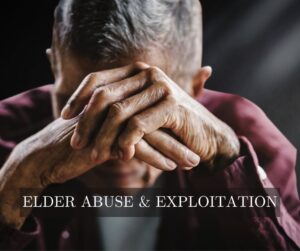Elder Abuse
 The U.S. Department of Justice defines elder abuse as “an intentional or negligent act by any person that causes harm or a serious risk of harm to an older adult.” It is broken down into five subtypes including physical abuse, psychological abuse, financial exploitation, neglect and abandonment, and sexual abuse.
The U.S. Department of Justice defines elder abuse as “an intentional or negligent act by any person that causes harm or a serious risk of harm to an older adult.” It is broken down into five subtypes including physical abuse, psychological abuse, financial exploitation, neglect and abandonment, and sexual abuse.
The New England Journal of Medicine published a paper in 2015 estimating one in ten elders will be the victim of some form of abuse. The number of reports of elder abuse in Montana is climbing. From 2021 to 2022, there was a 134% increase in abuse, 181% increase in neglect, and 142% increase in exploitation.
Elder Abuse Scams
As technology has advanced, so has the number of scams across the county. Particularly in Montana, scammers stole more than $7 million from Montanans. Scams are constantly evolving as thieves adapt to and take advantage of changing technology.
Elder abuse scams have become one of the most common forms of abuse and financial exploitation since elders are the most common victims of scams. When we think of scams, we usually think the perpetrator is someone far away and committing the crime remotely. But this is not always the case. The most common type of elder abuse scam is a family or caregiver scam. This is when relatives or acquaintances of the elderly victims take advantage of them or otherwise get their money. In fact, the most common perpetrators of elder abuse are caregivers, family, friends, and neighbors. While a family member or caregiver scam is the most common, the other types of scams are more random and usually occur with a remote perpetrator the victim has never met.
Another common elder abuse scam is a romance scam. This is when criminals pose as interested romantic partners on social media or dating websites to capitalize on their elderly victims’ desire to find companions. In 2022, confidence or romance scams collected $419,768,142 in losses – and that number is only based on reported data from the FBI Internet Crime Complaint Center. Nearly 70,000 people reported a romance scam to the Federal Trade Commission in 2022, with $1.3 billion in reported losses. About a third of these scams start on social media like Facebook or Instagram.
The third most common form is a tech support scam. This involves criminals posing as technology support representatives and they offer to fix non-existent computer issues. The scammers gain remote access to victims’ devices and sensitive information.
Scams are rampant across Montana and the nation. The Montana Department of Justice’s Office of Consumer Protection (OCP) fielded 974 scam complaints and saved Montanans from losing more than nearly $900,000 in 2022. A total potential loss of almost $3,000,000 was reported to OCP by Montanans who knew they were being targeted by a scammer but did not pay them. That is nearly $4 million in scams – and those are just the ones that are reported.
Physical, Psychological, and Financial Abuse
We know that older Americans are commonly targeted by bad actors looking to make money by scamming them, but a lesser-known fact is that it’s also common for criminals to inflict physical, emotional, and sexual abuse on the elderly. Many times, in health care facilities where they should feel safe and cared for. Oftentimes, perpetrators capitalize on elders’ vulnerabilities in general, and this includes their higher age and often isolation, chronic health problems, developmental disabilities, physical disabilities, and mental illnesses.
The Montana Department of Justice is committed to holding them accountable. Montana’s Division of Criminal Investigation provides direct assistance to criminally investigate elder abuse and exploitation within health care facilities through the Medicaid Fraud Control Unit. The complaints they may investigate include accusations of terrible living conditions, medications not being distributed, and residents not receiving basic care. Facilities that receive government funding but don’t even meet the minimum standards take resources away from their intended use. More importantly, these conditions take away residents’ dignity, infringe on their rights, and can even cost them their lives. Additionally, the Montana Department of Justice’s Elder Justice Prosecutor works with law enforcement agencies and prosecutors to hold offenders accountable.
Know the Signs
Warning signs of physical and/or psychological abuse include:
- Lack of basic hygiene, adequate foods, clean clothing, or medical aids such as glasses, a walker, teeth, a hearing aid, and medications
- A person with dementia left unsupervised or a bed-bound person left without care
- The home is cluttered, filthy, in disrepair, or having fire and safety hazards
- Withdrawal or social isolation in someone who previously was engaged and enjoyed company, which may also indicate sexual abuse or emotional abuse
- A caregiver who isolates the elder
- The caregiver who is verbally aggressive or demeaning, controlling, overly concerned about spending money, or if they are uncaring
- Inadequately explained fractures, bruises, welts, cuts, sores, or burns.
Warning signs of financial abuse include:
- A lack of amenities the victim could afford
- An elder “voluntarily” giving inappropriate financial reimbursement for needed care and companionship
- The caregiver has control of the elder’s money but is failing to provide for the elder’s needs
- The caretaker appears to be “living off” the elder, and if the elder has signed property transfers; (Power of Attorney, new will, etc.) when unable to comprehend the transaction
- Any abrupt changes to property ownership, control of accounts, and estate plans
- Isolation or the caregiver is preventing the victim from regular contact with family, friends, church groups, and neighbors
Resources
If you suspect or someone you know is a victim of elder abuse, please use the resources below as needed:
- If it’s an emergency, call 911
- If it’s not an emergency, you can contact your local law enforcement’s non-emergency line to report elder abuse
- The best number to call to report elder abuse, or if you think you might’ve been a witness to elder abuse, contact Adult Protection Services at 1-844-277-9300
- For elder abuse scams, contact the Montana DOJ’s Office of Consumer Protection at 1-800-481-6896
- For legal assistance, contact our Elder Justice Prosecutor at 406-444-1995
- Contact the Medicaid Fraud Control Unit in cases of Medicaid fraud at 1-800-201-6308
- For instances of Medicare fraud, call 1-800-633-4227 or visit www.medicare.gov
